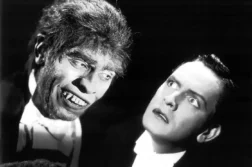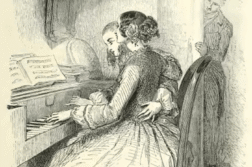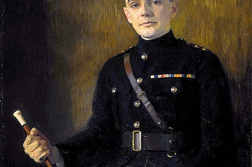IN 1925, when nineteen-year-old Klaus Mann had gained fame as the author of a scandalous play, a cartoon by Theodor Heine appeared in the Munich satirical magazine Simplicissimus. It showed an ephebic Klaus in short pants standing behind his illustrious father Thomas. One of the youth’s hands holds a sheaf of manuscripts, the other is laid daintily on the shoulder of his sour-looking sire, who is toiling away at a page full of crossed-out lines. The caption: “You must know, Papa, that geniuses never have geniuses for sons, so you must not be a genius.”
The joke was picked up by Bertolt Brecht, who remarked, “The whole world knows Klaus Mann, the son of Thomas Mann. By the way, who is Thomas Mann?” Such satire might seem to suggest that in Germany of the mid-1920’s Thomas, for all his eminence, was viewed as a relic of an obsolete era, the Age of the Bourgeoisie, while Klaus was accepted as the representative of Youth, the enigmatic, perverse, and unnerving rising generation. On the contrary, from the start of his literary career, the press disliked and distrusted Klaus Mann and ridiculed him as a Dichterkind, the offspring of a great writer incapable of emulating his father’s achievements.
Klaus Heinrich Thomas Mann was Thomas’s first male child, born in Munich in 1906, a year after his beloved sister Erika. Some of his artistic temperament was inherited from his mother Katia Pringsheim, who, as the Nazis were later quick to emphasize, had Jewish blood in her veins. Her father Alfred Pringsheim was a wealthy Jewish scholar and, paradoxically, a fervent proponent of Wagner. He became professor of mathematics at the University of Munich. He had married Hedwig Dohm, an actress whose father had founded the Berlin humor magazine Kladderadasch and whose mother was a pioneer of female emancipation. Katia Pringsheim was one of the first women in Germany to be granted a higher education.
Growing up in Munich under the influence of their art-loving grandparents, aloof and enigmatic father, and nurturing mother, the Mann children were soon singled out for their extraordinary appearance and behavior. Klaus and Erika, along with their younger siblings Golo and Monika, were decked out in arts-and-crafts linen smocks and Russian blouses, garb that attracted the gibes of street urchins. They were reared by a succession of nannies and maids, and regarded their household as a protected world ruled by the benevolent despotism of the family and its attendant vassals. Most children share this vision of their environment, but it is soon dispelled on contact with schools and other children. The Manns seem to have preserved the ideal longer; consequently, when it was shattered, the effect was all the more traumatic.
Klaus’s idyllic childhood was first interrupted in 1915 when acute appendicitis brought him close to death. This episode has been cited as the germ of a death fixation that led ultimately to his suicide. For all that, his convalescence testified to a desperate attachment to life, revealed in a reckless flurry of activities. In 1916 he and friends initiated the amateur theatricals that fed his love of dressing up and pretending to be someone else.
The Great War severely reduced the Manns’ princely way of life. They were too unworldly to cope with the ruthless practices of hoarders and black marketeers, and after the War, when all Bavaria was torn by revolution and briefly ruled by a Communist dictatorship, the Manns suffered a grievous humiliation. They discovered that their faithful retainer Affa had for years been a kleptomaniac who had squirreled away the loot in her locked room. She claimed that all of it, including Thomas’s vintage wines, was her own property. In the ensuing trial, held in the new revolutionary climate, the Manns were condemned as aristocratic persecutors of a victimized proletarian, and Affa was vindicated. Mad and resentful, she continued to haunt the neighborhood. This incident indelibly seared itself into young Klaus’s consciousness, making him fearful that the secure environment in which he had been raised was chimerical, masking depths of treachery and animosity. He began to view the world outside his private circle as profoundly hostile.
The uncertain atmosphere of the times allowed Klaus and Erika and their adolescent circle to cut classes and mingle with Munich bohemia. In 1922, when their ventures into shoplifting were ended by an arrest and their parents discovered their clandestine friendship with the actor Bert Fischel, they were packed off to the Bergschule Hochwaldhausen in central Germany. This removal from the parental hearth introduced Klaus to the Youth Movement, which was sweeping the country. Progressive, having both homoerotic and fascistic undertones, it preached the salvation of Germany by fostering youth groups within natural surroundings. Later in the year Klaus was transferred to the Odenwaldschule, a co-educational school for talented problem children in the mountains near Heidelberg.
This institution, founded in 1910 by Paulus Geheeb, had the hoped-for therapeutic effect: Klaus read voraciously and formed a respectful and lasting relationship with Geheeb, a new kind of adult, trustworthy and unfettered by social convention, living according to his own code of ethics. Young Klaus’s immersion in nature coincided with the onset of puberty, and had the unexpected result of eroticizing his environment. He later wrote, “My relationship to the landscape and to nature in general was determined by the mystico-erotic frame of mind in which I found myself. I embraced trees, I pressed my face against their bark, and I felt the soft cushion of moss as a caress beneath the thin soles of my sandals.” No wonder that when the hero of the novel The Pious Dance first catches sight of his beloved Niels, he begins to stroke the nearest tree.
Here too Klaus formed sentimental attachments to other boys. He had already indulged this penchant at the Wilhelmsgymnasium in Munich, where the chief object of his affections had been a dark-haired, smooth-faced athlete named Elmar, to whom he had sent an anonymous, typewritten poem. In the mountains the new beloved was again an athlete, but this time a blond named Uto. In his autobiography, The Turning Point, Klaus admits that strong, agile Uto was no Adonis, but possessed the kind of face he loved: high Slavic cheekbones, narrow eyes, fair Nordic hair that paled to tow in the sunshine, dry chapped lips, and ice-colored eyes mixed with silvery green lights, full of a “sweet and terrifying innocence.” This ideal of masculine beauty is transferred in The Pious Dance to the antagonist Niels.
“I wrote him poetry,” Klaus recalled of Uto, “which he never managed to read. I addressed him with names which he thought funny: Ganymede, Narcissus, Phaedrus, Antinous… He was a good lad, modest and gentle, devoid of malice; vain enough to delight in my homage but too naïf to recognize the true nature of my passion.” On an impulse that was both self-punishing and self-indulgent, Klaus decided to abandon this friendship by suddenly leaving school without parental permission.
On his unexpected return to Munich, Klaus and Erika threw themselves back into the bohemian atmosphere they so cherished. He paid his first visit to Berlin in 1923 and, fascinated by the Weimar-era metropolis, sought a way to return and settle there. His circle of friends expanded to include Pamela Wedekind, daughter of the late poet and playwright Frank Wedekind, who became a permanent companion in their adventures. In 1924 Klaus announced that he and Pamela were engaged. “How will you support her?” asked his dismayed parents. To no diminution of their dismay, he replied that he would become a dancer. Argument against this whimsical decision led to an agreement that he would select a more secure profession in the fall.
Meanwhile, Klaus spent the summer months in the Neuburg Cloister near Heidelberg, ostensibly studying. His room overlooking the Neckar River was furnished like the garret of an ascetic but pedophilic poet, with a photograph of Riemenschneider’s head of John the Baptist, another of a Greek youth, and a portrait of Uto, around which Klaus draped a rosary. The master of this cloister was Alexander von Bernus, an intimate of Rudolf Steiner, the founder of anthroposophy. Bernus was convinced that he possessed Paracelsus’ recipe for transmuting base metals into gold, and he performed alchemical experiments. This was why Klaus associated anthroposophy with the occult, and mistrusted both. In an early memoir, Child of These Times, he wrote: “I believed in all mysteries, but I did not enjoy seeing them sketched out as precisely as a road map. Archangels may reign—I think it quite likely that they do—; but I do not want certain persons in Stuttgart or outside Los Angeles to determine exactly when Michael is to turn his regiment over to Gabriel.”
Bernus’s wife, the Baroness Imogen, was a woman of charming manners but unsettling views. Their daughter Ursula Pia was scrawny, hard-bitten, and headstrong, but intelligent. Klaus also found the guests to the cloister to be fascinating: one was “an athletic, divinely beautiful lad,” a Bavarian Jew who, inspired by Bernus’s esotericism, tended in his mental abstraction to roam the cloister in the nude. Another was a mystical communist who mixed social revolution with metaphysics, and whose flaming red hair, hooked nose, and great glowing face made him look like Lucifer.
All these vivid impressions find a place in The Pious Dance. The cloister reappears as Frau Gartner’s mysterious villa with its river view, where alchemical experiments are carried out by the birdlike Dr. Zäuberlin. Ursula’s name is bestowed on Andreas’s fiancée, but her pinched nature is given to little Henriette Meyerstein and Fräulein Lisa, the anthroposophical artisan. Andreas’s dislike of Fräulein Lisa’s mystical visitors is essentially Klaus’s distrust of religions that discount this world in favor of the next. Elements of the fervent Jewish youth appear in Niels, who receives the tribute of the rosary framing his portrait, while the social revolutionary is transformed into the boy-loving utopian who appears in Andreas’s dressing-room. In short, like so many young and impressionable writers, Klaus Mann exploited in his early fiction the most striking experiences of his brief life with minimal transmutation.
Another product of the stay on the Neckar was a number of essays that were to become his first published writing. From early childhood on he had filled notebooks with plays, romances, and poetry, most of it highly derivative. Now he made money by publishing three short studies of Rimbaud, Huysmans, and Georg Trakl (“three decadent writers,” the conservatives might say) in the liberal newspaper Die Weltbühne. This success brought him back to Berlin, where he settled into a boarding house, determined to make a living. Barely seventeen, he arrived in the capital at the nadir of the inflation period, when both the German economy and German morale were at their lowest ebb. In this dog-eat-dog atmosphere, anything went, and prostitution, both male and female, was highly conspicuous. As Klaus wrote in The Turning Point:
The city seemed both pitiful and enticing: gray, shabby, demoralized, but still vibrating with nervous vitality, glistening, gleaming, phosphorescent, hectically animated, full of tensions and promise.
I was in seventh heaven. To be in Berlin meant an exciting adventure all by itself!! … The romanticism of the underworld was irresistible. … Berlin was my city! I wanted to stay. But how? The stupid money problem!
Work? Why not. … But washing dishes or playing elevator boy was out of the question. The position I sought had to be not only lucrative but amusing.
The solution was to perform in a cabaret. Back in Munich, Klaus had written a number of daring songs for homespun theatricals. He describes one of these parlor cabarets in Child of These Times:
The centerpiece of the program was a charming little medley of a revue, which W. E. Süskind had written for us. A weary count with a long cigarette holder parodied Oscar Wilde’s aphoristic style, a valet suddenly declared that his name was Dr Josef Ponten. Erika gossiped in her shop-girl dialect, and the dialogue was sprinkled with certain insidious, pseudo-profound “buzz words.” A trenchant music-hall song was sung with the chorus:
Perversion’s really swell, my boy,
Perversion keeps you well, my boy,
Perversion beats the standard brand,
Perversion makes your willy stand,
Perversion is beyond compare—
Whereupon a big metal sign swung down, with Perversion written in gaudy letters.
That was the way seventeen-year-olds played.
What was more natural than that these precocious talents be transferred to the stage of a sophisticated metropolitan cabaret? Klaus had already written to the master of ceremonies Paul Schneider-Duncker, known familiarly as Paulchen, asking for an engagement at Munich’s Bonbonnière. That cabaret was closed, the MC wrote back, but once in Berlin, Klaus paid a call on the elegant cabaret artist and asked him again for a position. Schneider-Duncker phoned Else Wardt, the proprietor of “Tü-Tü”:
He described me in the most flattering terms, while I sat beside him: “He’s a real attraction for the modern German cabaret stage, something very original, which should be shown as soon as possible.” — That very evening I was to go on. From a young actor who lived in the next room at the Wittenberg Square boarding house, I borrowed a tuxedo, a dickey and patent leather shoes. Trembling with excitement, I hurried to Kantstrasse. How astonished I must have been when the “Tü-Tü” people greeted me coolly. They sized me up with their eyes, which revealed an effort to conceal their contempt. The hall was still perfectly empty when I came on stage, pale in my tuxedo. Directly before me at a table sat several “colleagues”; I heard them laugh, while the footlights blinded me. My voice was gone, gone, gone. Not until I was on the stage did I consider which pieces I should select from my little lyric store. After a short pause I made up my mind and in a very shaky little voice began:
Perversion’s really swell, my boy—
Perversion keeps you well, my boy—
Not a hand stirred. Then in an even more wretched noise I warbled to the sneering cabaretists who were idling over their mochas, waiting for the real customers, that “We are so fond of makeup, ’Cause it makes us smell so sweet.” — It was the most embarrassing situation of my life.
Later I learned that Schneider-Duncker—highly talented both in his cabaret singing and his mode of teaching—had, after the dialogue which had sounded so encouraging in my presence, called back the proprietress of the “Tü-Tü” afterwards and said, “Listen, old girl, this raw youth is coming by tonight—a Dichterkind and so on—with the meschugenner idea he has to do music-hall. Treat him so that he loses the taste for it.” — I lost the taste. (Child of These Times)
Andreas, the hero of The Pious Dance undergoes much the same humiliation, but in his case the job works out and he learns to perform before a music-hall public. (The song of the hustler which he sings was originally written for a domestic theatrical in Munich.) The name Paulchen is borrowed from the clever cabaretist Schneider-Duncker and bestowed on the pathetic dancer who falls in love with Andreas. The dismissive cruelty of the heavily made-up Else Wardt is distilled into the venomous Alma Zeiserich.
Erika had moved in and played small parts for Max Reinhardt. Pamela, who was in the acting troupe of a Cologne theatre, paid flying visits. Klaus had gainful employment as a theatre critic, which gave him both financial security and entry to the Berlin art world. But his “decadence” remained cerebral. “A little orgy” at a friend’s apartment in Berlin, described years later, consisted harmlessly of staying up all night in colored pajamas, singing, declaiming, guzzling, dancing, painting each other’s faces, and driving to Grünewald at dawn.
Another important source of experience, a trip abroad, came at this time: Klaus traveled to London and Paris with his friend Süskind. London left him cold, but Paris exercised such a fascination that he wanted to move there permanently. Unlike Berlin, the attraction of Paris did not lie in its opportunities for “adventure.” “Berlin and Shanghai and New York may be adventurous cities,” he wrote years later when he had been round the world, but not Paris. Paris is highly civilized, skeptical, elegant, well balanced, certainly not eccentric. The night life in Cairo, Chicago, Budapest, Naples is “adventurous,” meaning dirty and criminal; but the Parisian nightlife is a more natural and integral ingredient of Parisian life. … Sex, in all its aspects and even in its aberrant manifestations, is treated in this city with a mixture of bold realism and almost religious devotion, which is characteristic of Eros in every mature civilization. (The Turning Point)
This abiding love for Paris is embodied in the last part of The Pious Dance, particularly in the early morning crawl through Les Halles that marks the last time Andreas and Niels are together.
This journey gave Klaus a taste for traveling, but the need to make a living recalled him to Berlin. The year 1925 was to prove his annus mirabilis: he first published a collection of short stories, Before Life; wrote and acted in the play Ania and Esther; and spent the summer writing The Pious Dance, which appeared the following year. Before Life is a highly derivative work, drawing on the novellas of the German Romantic period. The central figure is Kaspar Hauser, who had long fascinated Klaus as “the orphan of Europe”; Klaus identified with Hauser’s alienation from the world around him, his “outsiderhood” and inarticulateness. These oneiric prose poems have little in common stylistically with The Pious Dance, but certain abiding themes and topics are present: the desire for a mother-sister figure to aid him; and an attraction to blond youths who represent the love of life that’s denied to the swarthy, morbid Kaspar.
Ania and Esther, which was staged in Munich and Hamburg in October 1923, was a more light-hearted production. It is set in a parodic version of the Odenwaldschule, a “convalescent home for fallen children,” whose absent-minded director is modeled on Paulus Geheeb. In his full beard and short pants—and his open pedophilia—he is also a cartoon version of God the Father. A close-knit but spiritually complex relationship among four of the school’s charges, Ania, Esther, Kaspar, and Jakob, is thrown into confusion by the intrusion of the handsome Erik. In contrast with the sensual, experienced, worldly Erik, who has been kept by both men and women and has performed in circus and cabaret, the children suddenly strike each other as insipid and artificial. When Esther decides to leave the school with him, the other three are cast into impotent despair.
Essentially the theme of the play is the collision of adolescent fantasies and ideals with the seductive call of the real world, a clash that is to propel Andreas’s quest in The Pious Dance. In the Hamburg production, nineteen-year-old Klaus, Erika, and Pamela played the lead roles along with 25-year-old Gustaf Gründgens, who directed the play as well. In this period, the ambitious homosexual actor was one of Klaus’s closest friends, and was later briefly married to Erika. But already a worm of jealousy was burrowing into the relationship: the publicity for Ania and Esther regularly featured the Dichterkinder and their “descent” to the boards. And Gründgens, with his lower middle-class background and stagy ways, often seemed out of place in the largely upper-bourgeois ambience of the Mann and Wedekind households. Later, the tension between the Manns’ literary ambitions and liberal politics and Gründgens’ expedient careerism would culminate in a rupture. Once Klaus and Erika were exiles from Hitler’s Germany and Gründgens a leading figure in the Nazi-run theatre, these ancient differences would be expanded into Klaus’ novel Mephisto (1936), whose actor-protagonist stands for all those artists who made their peace with the fascist masters. The only damning characteristic Klaus left out of his portrayal of “Heinrich Höfgen” was Gründgens’ homosexuality, perhaps because he shared it.
Stage plays are public events and therefore Ania and Esther was attacked vehemently for its homophilic sentiments and displays. Klaus was even called “a felon against the German people” by one right-wing newspaper. Before the Vienna production, a rumor ran that Thomas Mann had refused to read the play because it was “too obscene.” But he publicly denied such nonsense, saying “I am no boarding-school miss.” In general, Thomas Mann regarded the more outrageous antics of his children with a deliberately bemused air, never condemning, rarely commenting. The relationship between himself and his eldest son would seem to be similar to that between Andreas and his father, who respect one another but lack the shared experience to communicate easily.
The Pious Dance was the most protracted work Klaus had written to date, and he chose modestly to subtitle it, “The Adventure Story of a Young Man,” apologizing in his preface for the deficiencies in achieving his aims. But reviewers and readers regarded it as a full-length novel. Although he began his literary career in the shadow of his father’s fame, Klaus was later to remark, “People took only too much notice of me.” His new-found notoriety helped split his life into two mutually-feeding entities. One was his continual, almost obsessive writing, for, as Hermann Kesten said, he “lived in literature and literature lived in him.” The other was his submersion in the artistic bohemia of the 1920’s, which found him residing in hotel rooms, cafés, and offices, avoiding the cozy bourgeois nest he had grown up in, leading a life that the conventional might condemn as “dissipated,” but which never kept him from his work. Throughout his life, he maintained an almost childlike ideal of “Purity,” and in this period cherished the paradoxical notion, embodied in The Pious Dance, that Purity could be achieved only by immersing oneself in what life had to offer.
He experimented with drugs, since cocaine was as common as champagne in Weimar Berlin, albeit more expensive. He enjoyed intense male friendships, particularly with his Munich school chum Ricki Hallgarten and the Parisian surrealist René Crével. (His engagement with Pamela Wedekind broke off in 1927 when she became attached to the aging playwright Carl Sternheim, whom she accompanied to the South of France where he died of a long-standing ailment.) Significantly, both Hallgarten and Crével, as well as others in Klaus’s intimate circle, were to commit suicide. Klaus himself would make five attempts on his own life before succeeding at last in 1949.
In Thomas Mann’s novel Doktor Faustus, the Halle student Konrad Deutschlin declares:
The concept of youth is a prerogative and a priority of our people, the Germans; the others hardly know it. German youth represents, precisely as youth, the Volksgeist itself, the German spirit, which is young and full of the future—immature if you will, but what does that mean! German deeds always come from a certain violent immaturity, and it is not for nothing that we are the people of the Reformation.
Laurence Senelick, professor of drama at Tufts University, is the author of The Changing Room: Sex, Drag and Theatre, among other books.





